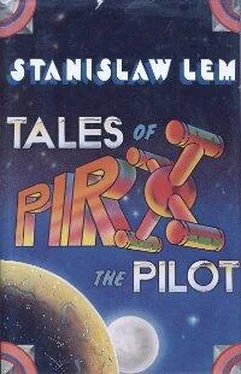And immediately he conjured up the image of a hook.
“Not so fast, fella!” Pirx said to himself, and he braked as abruptly as if he were on a collision course with an asteroid, though the radar was blank and the video screens likewise empty. Instinctively he bent his neck, tucked in his chin, and felt the automatic compressor fill his suit with an extra supply to compensate for the sudden acceleration, which didn’t stop him from having a momentary blackout.
The gravimeter plunged to -7, hovered there for a second, then climbed back up to -4. His AMU-111 had lost nearly a third of its velocity, dropping down to 145 kilometers per second.
Where was the light? For a moment he was afraid he’d lost track of it. No, it was there—just farther away, that’s all. The optical tracking device gave the distance as 240 kilometers. During those brief two seconds it could have increased its lead by a great deal more than that. That it hadn’t meant that it must have braked within seconds of when he did!
Then—later he was amazed that it could have taken him so long—he realized he was on the trail of that mysterious something encountered by Thomas and Wilmer while on patrol.
Until now he had not been conscious of any danger. Suddenly he was afraid—a momentary case of the jitters. It was highly unlikely, of course, but supposing the light did belong to an extraterrestrial ship…?
The light was moving closer… killing speed… closing the gap… 60… 50… 30… He decided to nudge a little closer, feathering the thrust… and watched in amazement as the thing ballooned—now only 2 kilometers off his bow!
On the other side of the couch was a pocket containing a pair of 24-power night glasses—used mainly in emergencies, in case of a radar malfunction, for example, or when approaching a satellite from the night side. But at the moment they were just what the doctor ordered. Their magnifying power was strong enough to bring the light to within the 100-meter range, and what he saw was a small disk, the color of diluted milk, similar in size to the Moon when viewed from Earth, its otherwise smooth surface marred by a continual procession of vertical smudges. When it eclipsed the stars, they faded only gradually, as if the disk’s outer rim was somehow thinner and more transparent than at the center.
But around the disk there was nothing, no luminosity to block out the starlight. Now, when examined through binoculars from a distance of 100 meters, a spaceship looks pretty much the size of a desk drawer. But there was nothing like that in sight, not a sign of any vehicle. And the little disk was definitely not somebody’s navigation light or exhaust flare.
It was just what it appeared to be: a solitary, self-propelled, little white light.
It was enough to drive a man batty!
He felt a tremendous urge to fire a shot at the thing, but without any weapons aboard—the regulations made no provision for them—that would have been no easy task. There were only two things Pirx could fire from the cabin: himself and a balloon probe. The patrolships were designed such that a pilot could eject himself in his encapsulated seat, together with a braking chute. This was done only as a last resort, and obviously there was no going back once a pilot had bailed out. That left the balloon probe—a remarkably simple device, consisting of a thin-walled rubber balloon that when deflated rolled up tightly enough to be a spear. To enhance its visibility, it was treated with an aluminum coating. Sometimes a pilot has a hard time telling by his aerodynamometer readings whether or not he has entered a planet’s atmosphere. Most importantly, he will want to know if any rarefied gas is lying in his path. When in doubt, he will fire the balloon, which inflates automatically and travels at a speed somewhat greater than the ship’s velocity. Because of its brightness, it is visible to the naked eye from as far away as 5 to 6 kilometers. If it encounters rarefied gas, the friction will cause it to heat up and explode. That’s when the pilot knows it’s time to start braking.
Pirx did his level best to aim the ship’s nose directly at the milky-white disk. Without the radar to guide him, he had to rely on the telescopic range finder. But trying to hit a target that size from a distance of almost 2 kilometers is no mean feat. Whenever he went to fire the balloon, the little disk would slip out of the line of fire. And no sooner would he bring his nose around, gently feathering his yaw jets, than the disk would do a nifty little sidestep and pop up again in the center of the screen. It repeated this maneuver four times in a row, each time with greater speed and facility, as if it were already starting to second-guess him. And judging by the way it flew slightly off course, at an angle, it was clear the disk had no intention of letting the AMU-111 fire point-blank at it.
This was fantastic. To react to such minute changes in his ship’s attitude, at a distance of 200 meters, the disk would have had to be using a telescope of gigantic proportions—of which nary a trace. But not only was it capable of carrying out a tricky evasive maneuver, it did so with only a split-second delay at the most.
His anxiety grew. He had done everything in his power to identify this uncanny flying object—and was not the least bit wiser than at the beginning. Then, while he was sitting there, immobilized, his hands gradually turning numb on the controls, it suddenly hit him that Thomas and Wilmer must have experienced the very same thing. They, too, must have sighted the light, tried to pick up the call numbers of what they took to be a UFO, given chase when they got no answer, kept track of it through the telescopic range finder, spotted the lacy little squiggles, maybe even fired a balloon probe, and then—then done something that made it unlikely that they would ever return.
When he realized how close he was to sharing the same fate, he felt not fear but despair. The whole thing was like a bad dream, a nightmare in which he couldn’t tell which part he was playing: himself, Thomas, or Wilmer. Because what was happening now was just a repeat performance—that much was clear. He sat paralyzed, profoundly convinced that the game was up. And worst of all, he couldn’t even say what the danger was, or from which direction it would come, with all this empty space around…
Empty?
Yes, the sector was empty, but then he had been chasing the little light for well over an hour, up to speeds of 230 kilometers per second. By now it was possible, if not altogether certain, that he was approaching the sector’s outer perimeter, or had already crossed it. And beyond that? Sector 1009, another 1.5 trillion kilometers of space. So there he was, surrounded by a void, by millions and millions of kilometers of nothing—and what should he have 2 kilometers off his bow but a pirouetting light!
He exerted all his powers of concentration. What would they have done—Thomas and Wilmer—right now, at this very second? Because whatever they had done, he would have to do something altogether different. Otherwise he wouldn’t come back alive.
Again he braked, again the needle shook, again his speed dropped—from 30, down to 22, to 13, to 5 kilometers per second—until the needle fluttered gently above zero. Technically speaking, he was already stopped; in space, speed is constant, always relative to something else; there’s no such thing as absolute zero, as on Earth.
The light began to shrink, retreating farther and farther… becoming dimmer and dimmer; then it reversed the process, gradually gaining in size and color, until it came to a stop again, 2 kilometers off his bow.
What would Thomas and Wilmer not have done? he wondered. What was the one thing they definitely would have avoided doing? Would they have made a run for it? Never! Not from a measly little speck, from such a dippy little dot!
Читать дальше












